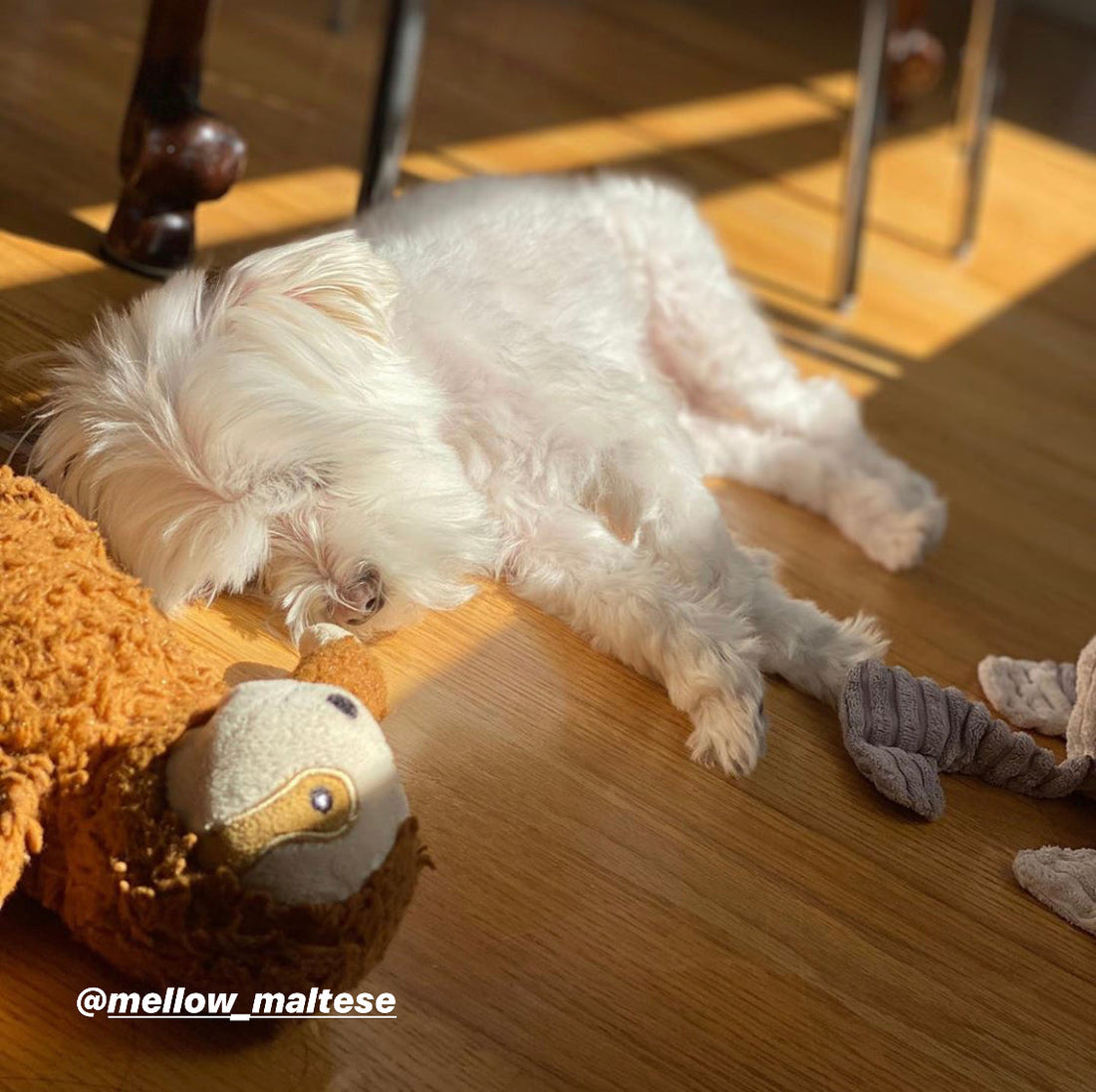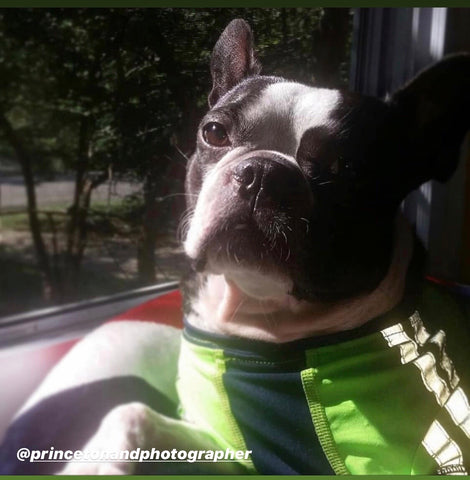
Does Glass Block The Sun Damage For You And Your Pup?
Share
A bright sun light is always welcome to all. Like humans, dogs love the warmth of the sun on their skin. On sunny days you will find your dog like my pup, lounging and napping in the sunlight for hours. You might think the glass protects them from the sun damage. Many times people tell me my dog doesn’t need protection he/she is inside.
I decided to research this topic to find out if humans and dogs are truly safe from the sun damage by the window and how much protection we receive from glass windows, if any.
Types Of UV Light
The terms ultraviolet light and UV refer to a relatively large wavelength range between 400 nanometers (nm) and 100 nm. It falls between violet visible light and x-rays on the electromagnetic spectrum. UV is described as UVA, UVB, UVC, near ultraviolet, middle ultraviolet, and far ultraviolet, depending on its wavelength. UVC is completely absorbed by Earth's atmosphere, so it doesn't pose a risk to health. UV light from the sun and man-made sources are mainly in the UVA and UVB range.
These 2 types of ultraviolet (UV) rays from the sun can cause DNA damage in your skin, even from brief exposures. The shorter UVB rays are the ones that cause sunburn, while the longer UVA rays cause tanning as well as skin aging and wrinkles in humans. Over time, the damage from either or both types of rays can lead to skin cancer. For dogs both UVA and UVB is harmful.
Do Pets Get Sunburned?
Yes, pets can suffer from sunburns, too! Overexposure to ultraviolet rays, both UVA and UVB, can lead to sunburn. Dogs and cats can get red, inflamed skin, just like in humans, which can become irritated and painful. The sunburn can lead to hair loss, dry scaly skin. Older dogs are even more prone to sunburn and their skin is more sensitive to sun.
What Causes Sunburn?
Exposure to the ultraviolet (UVA and UVB) rays of the solar spectrum can damage epithelial structures in the skin, which can lead to inflammation and destruction of the skin immune system. Prolonged and repeated exposure can cause permanent damage and can fundamentally change skin cells, resulting in malignancies and skin cancer.
How Much UV Is Filtered By Glass?
Window glass that is used in homes and offices does not filter much UVA. UVA leads to skin damage and genetic mutations that can lead to cancer. Glass does not protect you from skin damage from the sun.
Sometimes glass is treated to protect against UVA. For example, most sunglasses made from glass are coated so they block both UVA and UVB. The laminated glass of automobile windshields offers some (not total) protection against UVA. Automotive glass used for side and rear windows ordinarily does not protect against UVA exposure.
Tinting glass reduces the amount of both visible and UVA transmitted through it. Some UVA still gets through, though. On average, 60–70% of UVA still penetrates tinted glass.
Windshields are treated to shield drivers from some UVA, but side, back and sunroof windows usually aren’t. So when you’re in your car, you should protect yourself and your pup from that sunlight shining through the glass. Regardless they are sitting in front or in the back.
The same holds true for windows on airplanes, trains and buses if your dog is by the window. They need protection.
Have you ever felt like you’re burning up sitting on the sunny side by an airplane window? Yes, you’re being bombarded by UVA up there, too, and maybe even more so because of being at high altitude. (Airline pilots and crew members tend to get more skin cancer than people in other professions.)
How To Protect Your Pup From The Sun Damages?
Repeated sun exposure is harmful to our pets regardless they are inside laying by the window or outside. It is important to follow few tips to protect them:
- If possible try to avoid sun exposure during the middle of the day from 10am-4pm. Specially during the summertime, when the UV exposure is at its peak.
- Wear UPF50 clothing. UPF50 clothing blocks 98% of UV rays, is the simple and safe way to keep rays at bay and unlike sunscreen you don’t need to reapply it. Make sure the shirt covers the back completely, stomach and shoulder. The UPF50 sun shirt is different than rash guards. Rash guards are usually worn for water activities. They are heavier materials which can get too hot to wear outside of water.
- Use dog sunscreens of at least SPF15. Dogs and cats can benefit from carefully applied sunscreen. It is important to apply it to the most vulnerable skin surfaces: those with little to no hair coat, like ear tips (cats), top of muzzle (dogs), armpits, abdomen, groin. Be careful to note that it does not contain PABA (para-aminobenzoic acid) or zinc oxide – both chemicals can be toxic to our companions! To start, apply the sunscreen to a small spot on the body first, to confirm no allergic reaction. If tolerated well, apply a generous amount twice daily the skin surfaces most at risk. It may be helpful to apply the sunscreen and then provide a distraction, such as food, a walk, or a game of ball, in order to prevent the pet from licking off the sunscreen immediately.
- Avoid a very short haircut. If your dog is regularly groomed, avoid a very short haircut in the summer as a longer hair coat will still offer some protection from sun exposure.
What Is UPF In Clothing?
Ultraviolet Protection Factor (UPF) indicates how much UV radiation (both UVB and UVA) a fabric allows to reach the skin. For example, a UPF 50 fabric blocks 98 percent of the sun’s rays and allows two percent (1/50th) to penetrate, thus reducing the exposure risk significantly.
How Does UPF Differ From SPF?
UPF measures the amount of UV radiation that can penetrate fabric and reach the skin. Sun Protection Factor, or SPF, is based on the time it takes for UV-exposed skin to redden; if you burn after 20 minutes, if used correctly, an SPF 15 sunscreen may protect your skin 15 times longer.
Another important distinction: UPF measures both UVB and UVA rays, while SPF measures only UVB.
The Bottom Line “Live a Sun-Safe Life”
All glasses are not created equal, so the amount of ultraviolet light penetrating the material depends on the type of glass. But ultimately, glass offers no real protection against sun damage to the skin or eyes. Remember that no matter your pup is at home sun bathing by the window inside the house or are in a car ride in the back seat, they still need sun protection every day, all year long even on a cloudy days. Up to 80% of the sun’s UV rays can penetrate clouds, so it is important to consider sun protection for them. Your pup can enjoy the sun without compromising their health.
Let us know if you have any questions or comments about this article. We appreciate you sharing it on your social media sites and groups.

